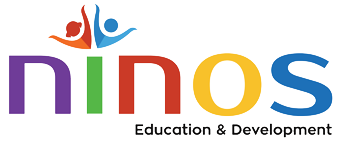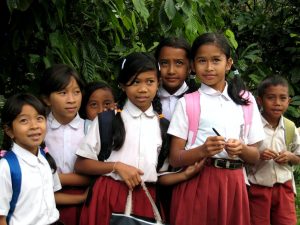Introduction
In a rapidly changing global landscape, the need for evidence-based strategies in education and community development has never been more urgent. NINOS Education & Development emerges as a leading consultancy organization with a deep commitment to generating knowledge, strengthening local capacity, and ensuring that every research initiative contributes to meaningful, sustainable impact. Whether addressing learning outcomes in Papua, shaping village-level educational roadmaps, or evaluating the reach of reading programs, NINOS stands at the intersection of knowledge and action.
NINOS Education & Development is more than a research consultancy. We are a bridge between data and development, between questions and solutions, and between communities and systems. Through high-quality research, participatory approaches, and strong partnerships, we support Indonesia’s goals in foundational learning, equity, and sustainable community development. NINOS works alongside governments, civil society organizations, and community actors to design and evaluate programs that transform lives.
Who We Are
NINOS Education & Development is a research-based consultancy organization specializing in applied research for education and community development. We conduct baseline and endline studies, formative research, impact assessments, and program evaluations across a broad range of interventions. NINOS was founded on the belief that research should not be abstract—it should inform practice, enhance equity, and empower communities.
We work with development partners, non-governmental organizations (NGOs), government agencies, and international institutions to assess and improve the effectiveness, relevance, and sustainability of education and development initiatives.
What We Do: Our Areas of Expertise
NINOS offers tailored research and advisory services in the following areas:
- Baseline and Endline Studies: Establishing the starting point and measuring progress of programs using robust quantitative and qualitative indicators.
- Program Evaluations: Conducting formative, mid-term, and summative evaluations based on international standards like OECD-DAC.
- Impact Assessments: Using experimental and quasi-experimental designs to assess changes in learning, well-being, participation, and community outcomes.
- Needs Assessments: Identifying gaps and opportunities in target populations to inform program design.
- Formative Studies: Supporting program development through rapid, participatory assessments that provide contextual insights.
- Applied Research: Producing practical, user-oriented knowledge that enhances policy and programming.
Our Methodological Approach
We integrate rigor and relevance in every research engagement:
- Mixed-Methods Design: Combining the strength of qualitative insights with the validity of quantitative analysis.
- Participatory and Community-Based Approaches: Engaging local actors not just as subjects, but as co-creators of knowledge.
- Child-Sensitive and Inclusive Tools: Ensuring ethical and age-appropriate engagement, especially in early childhood and school-based research.
- GIS and Digital Tools: Utilizing KoboToolbox, Tangerine, SPSS, R, and QGIS to improve data accuracy and visualization.
- Ethics and Safeguarding: Following strict ethical protocols including informed consent, anonymity, and secure data handling.
Our Impact: Project Highlights
Technical Program CRC Evaluation (2025)
NINOS was the lead evaluation partner for the Technical Program: Children Reading with Comprehension (TP CRC) implemented by Wahana Visi Indonesia World Vision) in Papua. The endline showed reading comprehension among Grade 3 students doubled (32% to 64%). Through STAR assessment, caregiver surveys, and multivariate analysis, the evaluation identified key predictors such as silent reading, vocabulary instruction, and home language use. Recommendations included bilingual instruction and after-school reading club revitalization.
Community Engagement and Sponsorship Plan (2025) Ninos led the national evaluation of the Community Engagement and Sponsorship Plan (CESP), implemented by Wahana Visi Indonesia across 24 Area Programs from FY22 to FY25. Using a robust mixed-methods approach—including surveys of over 10,000 caregivers and adolescents, as well as 140+ FGDs and KIIs—the evaluation revealed significant improvements in community cohesion, caregiver–child relationships, and child protection engagement. Community participation in child protection efforts tripled (from 15.9% to 49.2%), while adolescent-caregiver relationship indicators surpassed FY25 targets. The evaluation also found that 92% of partners met capacity benchmarks by endline, a marked increase from 41% at baseline, driven by technical capacity-building support. Recommendations highlighted the need for sustainable systems including modular parenting education, integration with village governance, and strengthening child protection reporting mechanisms.
Papua Basic Literacy Roadmap Development (2024)
NINOS collaborated with Tira Malino as the lead technical partner in developing the Papua Basic Literacy Roadmap 2025–2029, commissioned by KOLABORASI USAID and Wahana Visi Indonesia. This strategic document was formulated through an inclusive, participatory process involving the Ministry of Education, Government of Papua, local education foundations, indigenous Papuan representatives, and development partners. NINOS led the technical drafting, facilitated multi-stakeholder consultations, and integrated national priorities (RPJMN, RIPPP) and local contexts to ensure policy alignment and feasibility. The roadmap provides a comprehensive framework for embedding basic literacy programs in provincial planning and budgeting, advancing educational equity, and supporting Papua’s autonomous development in education. This project highlights NINOS’ capacity in policy research, strategic planning, and collaborative engagement with government and civil society for systemic education reform.
Balanced Reading Program (2024)
NINOS served as the lead research partner for the Balanced Reading Program Phase 2, implemented by Yayasan Literasi Anak Indonesia (YLAI) in West and Central Sumba with funding from UBS Optimus Foundation. The endline study demonstrated a fourfold increase in students mastering basic literacy (from 12.9% to 51.9%) and substantial gains in reading fluency and comprehension. NINOS applied EGRA-adapted tools, KOBO-based surveys, and classroom observations to generate robust evidence. Key findings highlighted the role of teacher working groups, leveled books, and principal engagement in driving impact. NINOS provided actionable recommendations to sustain program gains through BOS fund support, local government advocacy, and strengthened school-level supervision.
Assessment of School Readiness for COVID-19 Mitigation (2022)
NINOS, in collaboration with PREDIKT, conducted an extensive national assessment on school readiness to mitigate COVID-19 risks, commissioned by UNICEF Indonesia. The study involved 2,042 school principals through surveys and engaged 337 participants in 71 focus group discussions and 53 key informant interviews across Aceh, Central Java, South Sulawesi, and Papua. The findings revealed that 99% of schools had resumed face-to-face learning in either full or limited capacity, although gaps persisted in health protocol adherence and digital infrastructure. NINOS provided actionable recommendations, including strengthening local government monitoring, enhancing school-level capacity-building, and promoting effective use of BOS funds for COVID-19 safety measures. This project highlights NINOS’ expertise in managing large-scale, multi-stakeholder research, delivering evidence to inform national education policy during emergencies.
Gender-Based Violence Norms Research (2022)
As a trusted partner in educational and social research, NINOS led the formative study on gender-based violence (GBV) norms and practices towards children in Sumba, in partnership with Save the Children Indonesia. The study engaged 602 caregivers, 601 children, 120 teachers, and 22 key informants across West and Central Sumba through surveys, key informant interviews (KIIs), focus group discussions (FGDs), and Social Norm Exploration Tools (SNET). Findings revealed that while over 68% of caregivers and teachers held favorable views on gender equality, harmful practices like belis and marriage capture continue to influence social norms. NINOS provided evidence-based recommendations promoting gender-transformative action, integration of GBV awareness in school curricula, and community advocacy involving traditional leaders
Why Choose NINOS
- Contextual Understanding: We work across Indonesia with deep understanding of local language, geography, and sociopolitical dynamics.
- Flexible and Responsive: Our team adapts rapidly to client needs, whether in rapid data collection, policy brief development, or community facilitation.
- Evidence into Action: NINOS is committed to translating research into practical tools—evaluation briefs, story-based reports, training materials, and dashboards.
- Trusted by Partners: We work closely with UNICEF, WVI, ARNEC, provincial governments, and education-focused coalitions.
Our Team
NINOS is led by a multidisciplinary team of education researchers, development planners, data analysts, and community facilitators. Our core team is supported by a pool of trained enumerators and regional researchers. Key staff bring advanced degrees and real-world experience in early childhood education, curriculum design, public policy, statistics, and behavioral sciences.
Let’s work together to make education and research truly transformative.
Get In Touch
For partnerships, inquiries, or project collaborations:
Email: ninos.nanus@gmail.com; mega.indrawati@niinos-eddev.com
Phone: +62 812-8999-1115
Website: https://ninos-eddev.com/
Instagram; https://www.instagram.com/ninoseducation/?hl=id @ninoseducation




